A Critical Study on Elitism and Discrimination in UK Private Schools
VerifiedAdded on 2022/08/13
|12
|3376
|25
Essay
AI Summary
This essay critically analyzes the elitist attitudes, racism, and social discrimination within UK private schools. It highlights how these institutions, governed independently and often outside the National Curriculum, perpetuate classism and social disparities. The study examines the historical context of private schooling in the UK, emphasizing its role in economic advantage and the concentration of prestigious professions among its alumni. The essay delves into issues such as the disproportionate representation of private school attendees in influential positions, the impact of small class sizes, and the economic strength of these schools. It argues against the inherent inequality, low social mobility, and perpetuation of privilege, particularly in the context of a divided society. The essay also discusses the financial schemes, such as “Assisted Places Scheme”, implemented to make private schools affordable for students from marginalized backgrounds and its impact. It also explores the experiences of middle-class students and the internalized culture of social stigma in private schools, offering recommendations to address these issues and promote a more equitable educational environment. This paper focuses on the weaknesses of private schools apart from its strengths and tries to provide recommendations so that such happenings can be tackled within the school premises.
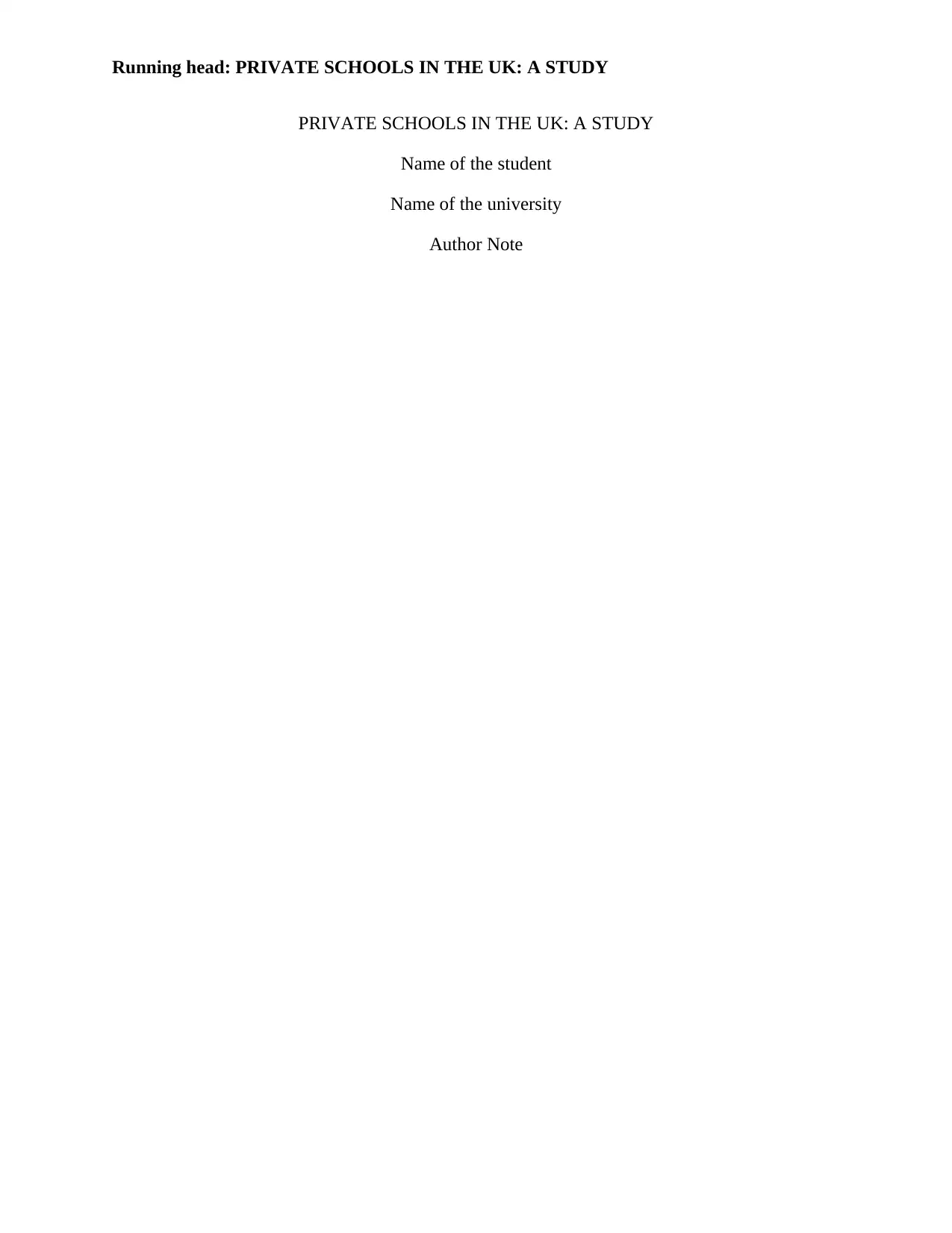
Running head: PRIVATE SCHOOLS IN THE UK: A STUDY
PRIVATE SCHOOLS IN THE UK: A STUDY
Name of the student
Name of the university
Author Note
PRIVATE SCHOOLS IN THE UK: A STUDY
Name of the student
Name of the university
Author Note
Paraphrase This Document
Need a fresh take? Get an instant paraphrase of this document with our AI Paraphraser
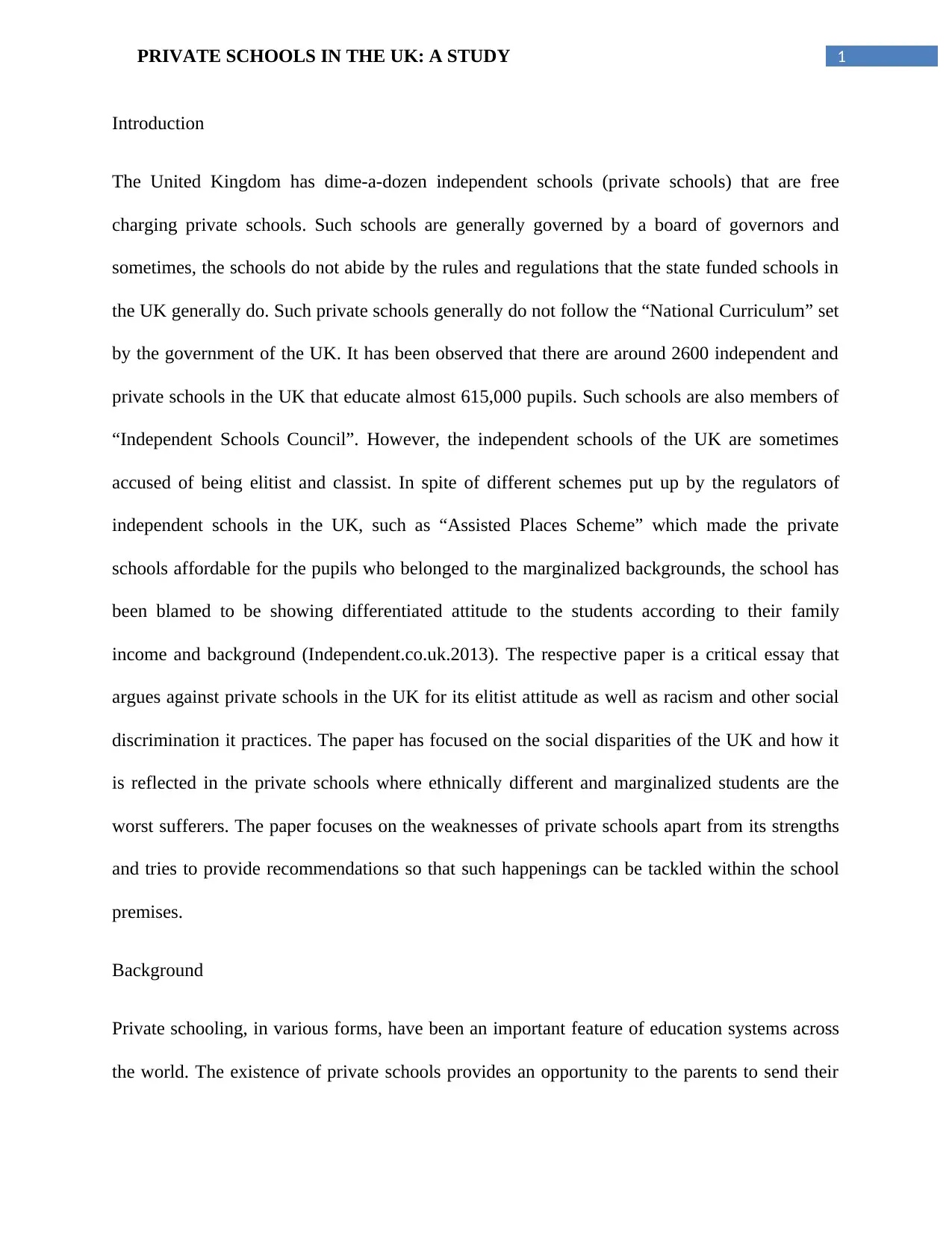
1PRIVATE SCHOOLS IN THE UK: A STUDY
Introduction
The United Kingdom has dime-a-dozen independent schools (private schools) that are free
charging private schools. Such schools are generally governed by a board of governors and
sometimes, the schools do not abide by the rules and regulations that the state funded schools in
the UK generally do. Such private schools generally do not follow the “National Curriculum” set
by the government of the UK. It has been observed that there are around 2600 independent and
private schools in the UK that educate almost 615,000 pupils. Such schools are also members of
“Independent Schools Council”. However, the independent schools of the UK are sometimes
accused of being elitist and classist. In spite of different schemes put up by the regulators of
independent schools in the UK, such as “Assisted Places Scheme” which made the private
schools affordable for the pupils who belonged to the marginalized backgrounds, the school has
been blamed to be showing differentiated attitude to the students according to their family
income and background (Independent.co.uk.2013). The respective paper is a critical essay that
argues against private schools in the UK for its elitist attitude as well as racism and other social
discrimination it practices. The paper has focused on the social disparities of the UK and how it
is reflected in the private schools where ethnically different and marginalized students are the
worst sufferers. The paper focuses on the weaknesses of private schools apart from its strengths
and tries to provide recommendations so that such happenings can be tackled within the school
premises.
Background
Private schooling, in various forms, have been an important feature of education systems across
the world. The existence of private schools provides an opportunity to the parents to send their
Introduction
The United Kingdom has dime-a-dozen independent schools (private schools) that are free
charging private schools. Such schools are generally governed by a board of governors and
sometimes, the schools do not abide by the rules and regulations that the state funded schools in
the UK generally do. Such private schools generally do not follow the “National Curriculum” set
by the government of the UK. It has been observed that there are around 2600 independent and
private schools in the UK that educate almost 615,000 pupils. Such schools are also members of
“Independent Schools Council”. However, the independent schools of the UK are sometimes
accused of being elitist and classist. In spite of different schemes put up by the regulators of
independent schools in the UK, such as “Assisted Places Scheme” which made the private
schools affordable for the pupils who belonged to the marginalized backgrounds, the school has
been blamed to be showing differentiated attitude to the students according to their family
income and background (Independent.co.uk.2013). The respective paper is a critical essay that
argues against private schools in the UK for its elitist attitude as well as racism and other social
discrimination it practices. The paper has focused on the social disparities of the UK and how it
is reflected in the private schools where ethnically different and marginalized students are the
worst sufferers. The paper focuses on the weaknesses of private schools apart from its strengths
and tries to provide recommendations so that such happenings can be tackled within the school
premises.
Background
Private schooling, in various forms, have been an important feature of education systems across
the world. The existence of private schools provides an opportunity to the parents to send their
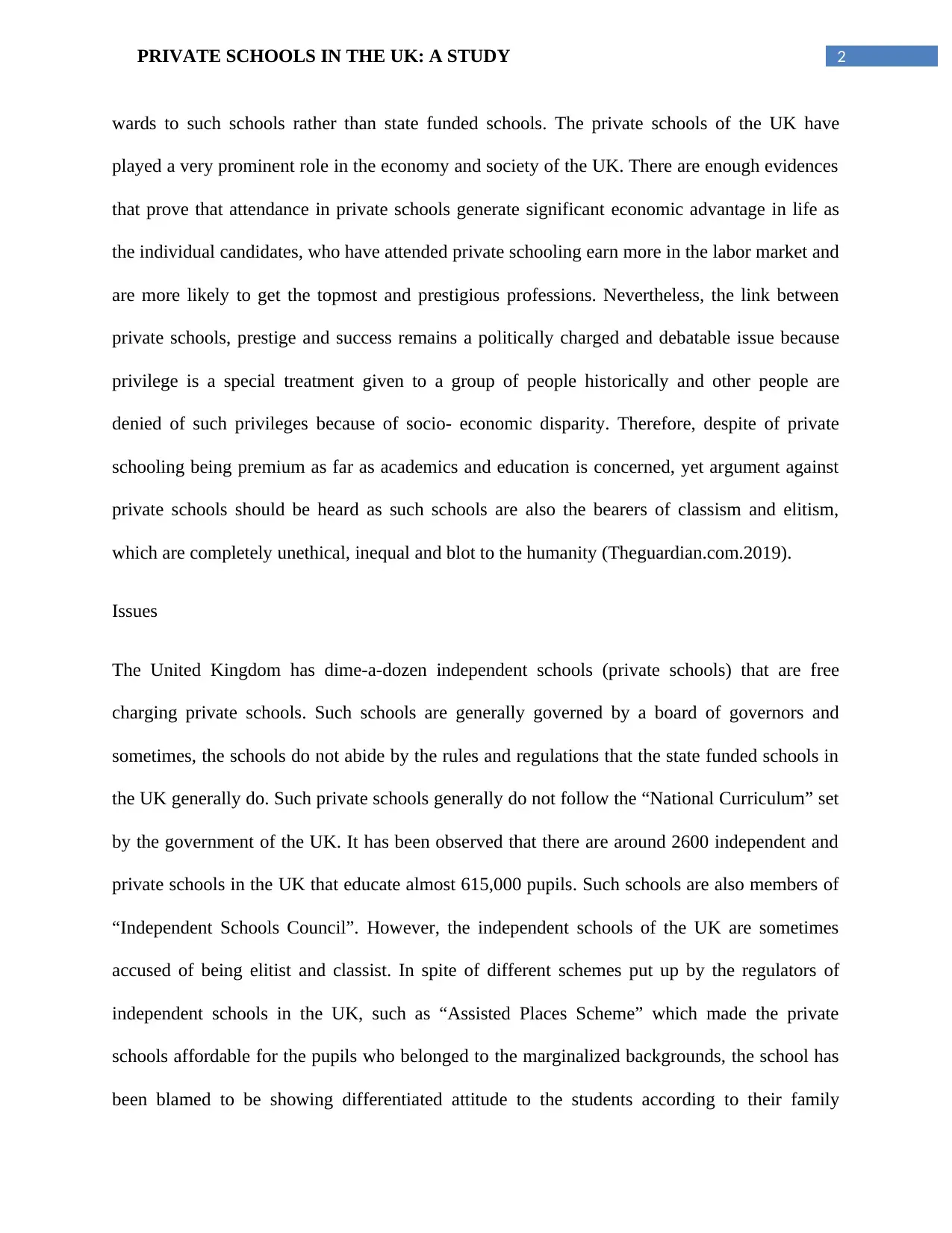
2PRIVATE SCHOOLS IN THE UK: A STUDY
wards to such schools rather than state funded schools. The private schools of the UK have
played a very prominent role in the economy and society of the UK. There are enough evidences
that prove that attendance in private schools generate significant economic advantage in life as
the individual candidates, who have attended private schooling earn more in the labor market and
are more likely to get the topmost and prestigious professions. Nevertheless, the link between
private schools, prestige and success remains a politically charged and debatable issue because
privilege is a special treatment given to a group of people historically and other people are
denied of such privileges because of socio- economic disparity. Therefore, despite of private
schooling being premium as far as academics and education is concerned, yet argument against
private schools should be heard as such schools are also the bearers of classism and elitism,
which are completely unethical, inequal and blot to the humanity (Theguardian.com.2019).
Issues
The United Kingdom has dime-a-dozen independent schools (private schools) that are free
charging private schools. Such schools are generally governed by a board of governors and
sometimes, the schools do not abide by the rules and regulations that the state funded schools in
the UK generally do. Such private schools generally do not follow the “National Curriculum” set
by the government of the UK. It has been observed that there are around 2600 independent and
private schools in the UK that educate almost 615,000 pupils. Such schools are also members of
“Independent Schools Council”. However, the independent schools of the UK are sometimes
accused of being elitist and classist. In spite of different schemes put up by the regulators of
independent schools in the UK, such as “Assisted Places Scheme” which made the private
schools affordable for the pupils who belonged to the marginalized backgrounds, the school has
been blamed to be showing differentiated attitude to the students according to their family
wards to such schools rather than state funded schools. The private schools of the UK have
played a very prominent role in the economy and society of the UK. There are enough evidences
that prove that attendance in private schools generate significant economic advantage in life as
the individual candidates, who have attended private schooling earn more in the labor market and
are more likely to get the topmost and prestigious professions. Nevertheless, the link between
private schools, prestige and success remains a politically charged and debatable issue because
privilege is a special treatment given to a group of people historically and other people are
denied of such privileges because of socio- economic disparity. Therefore, despite of private
schooling being premium as far as academics and education is concerned, yet argument against
private schools should be heard as such schools are also the bearers of classism and elitism,
which are completely unethical, inequal and blot to the humanity (Theguardian.com.2019).
Issues
The United Kingdom has dime-a-dozen independent schools (private schools) that are free
charging private schools. Such schools are generally governed by a board of governors and
sometimes, the schools do not abide by the rules and regulations that the state funded schools in
the UK generally do. Such private schools generally do not follow the “National Curriculum” set
by the government of the UK. It has been observed that there are around 2600 independent and
private schools in the UK that educate almost 615,000 pupils. Such schools are also members of
“Independent Schools Council”. However, the independent schools of the UK are sometimes
accused of being elitist and classist. In spite of different schemes put up by the regulators of
independent schools in the UK, such as “Assisted Places Scheme” which made the private
schools affordable for the pupils who belonged to the marginalized backgrounds, the school has
been blamed to be showing differentiated attitude to the students according to their family
⊘ This is a preview!⊘
Do you want full access?
Subscribe today to unlock all pages.

Trusted by 1+ million students worldwide
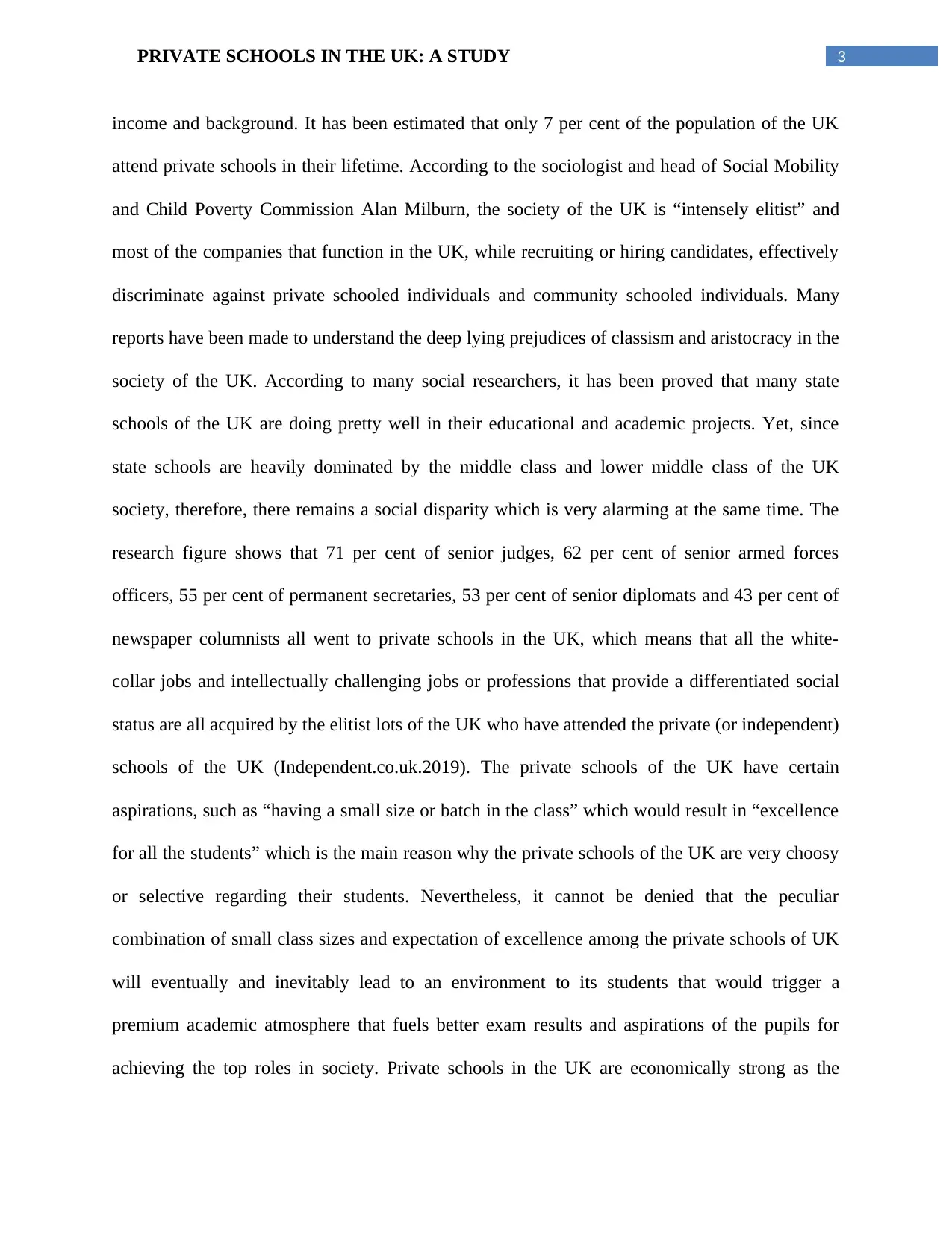
3PRIVATE SCHOOLS IN THE UK: A STUDY
income and background. It has been estimated that only 7 per cent of the population of the UK
attend private schools in their lifetime. According to the sociologist and head of Social Mobility
and Child Poverty Commission Alan Milburn, the society of the UK is “intensely elitist” and
most of the companies that function in the UK, while recruiting or hiring candidates, effectively
discriminate against private schooled individuals and community schooled individuals. Many
reports have been made to understand the deep lying prejudices of classism and aristocracy in the
society of the UK. According to many social researchers, it has been proved that many state
schools of the UK are doing pretty well in their educational and academic projects. Yet, since
state schools are heavily dominated by the middle class and lower middle class of the UK
society, therefore, there remains a social disparity which is very alarming at the same time. The
research figure shows that 71 per cent of senior judges, 62 per cent of senior armed forces
officers, 55 per cent of permanent secretaries, 53 per cent of senior diplomats and 43 per cent of
newspaper columnists all went to private schools in the UK, which means that all the white-
collar jobs and intellectually challenging jobs or professions that provide a differentiated social
status are all acquired by the elitist lots of the UK who have attended the private (or independent)
schools of the UK (Independent.co.uk.2019). The private schools of the UK have certain
aspirations, such as “having a small size or batch in the class” which would result in “excellence
for all the students” which is the main reason why the private schools of the UK are very choosy
or selective regarding their students. Nevertheless, it cannot be denied that the peculiar
combination of small class sizes and expectation of excellence among the private schools of UK
will eventually and inevitably lead to an environment to its students that would trigger a
premium academic atmosphere that fuels better exam results and aspirations of the pupils for
achieving the top roles in society. Private schools in the UK are economically strong as the
income and background. It has been estimated that only 7 per cent of the population of the UK
attend private schools in their lifetime. According to the sociologist and head of Social Mobility
and Child Poverty Commission Alan Milburn, the society of the UK is “intensely elitist” and
most of the companies that function in the UK, while recruiting or hiring candidates, effectively
discriminate against private schooled individuals and community schooled individuals. Many
reports have been made to understand the deep lying prejudices of classism and aristocracy in the
society of the UK. According to many social researchers, it has been proved that many state
schools of the UK are doing pretty well in their educational and academic projects. Yet, since
state schools are heavily dominated by the middle class and lower middle class of the UK
society, therefore, there remains a social disparity which is very alarming at the same time. The
research figure shows that 71 per cent of senior judges, 62 per cent of senior armed forces
officers, 55 per cent of permanent secretaries, 53 per cent of senior diplomats and 43 per cent of
newspaper columnists all went to private schools in the UK, which means that all the white-
collar jobs and intellectually challenging jobs or professions that provide a differentiated social
status are all acquired by the elitist lots of the UK who have attended the private (or independent)
schools of the UK (Independent.co.uk.2019). The private schools of the UK have certain
aspirations, such as “having a small size or batch in the class” which would result in “excellence
for all the students” which is the main reason why the private schools of the UK are very choosy
or selective regarding their students. Nevertheless, it cannot be denied that the peculiar
combination of small class sizes and expectation of excellence among the private schools of UK
will eventually and inevitably lead to an environment to its students that would trigger a
premium academic atmosphere that fuels better exam results and aspirations of the pupils for
achieving the top roles in society. Private schools in the UK are economically strong as the
Paraphrase This Document
Need a fresh take? Get an instant paraphrase of this document with our AI Paraphraser
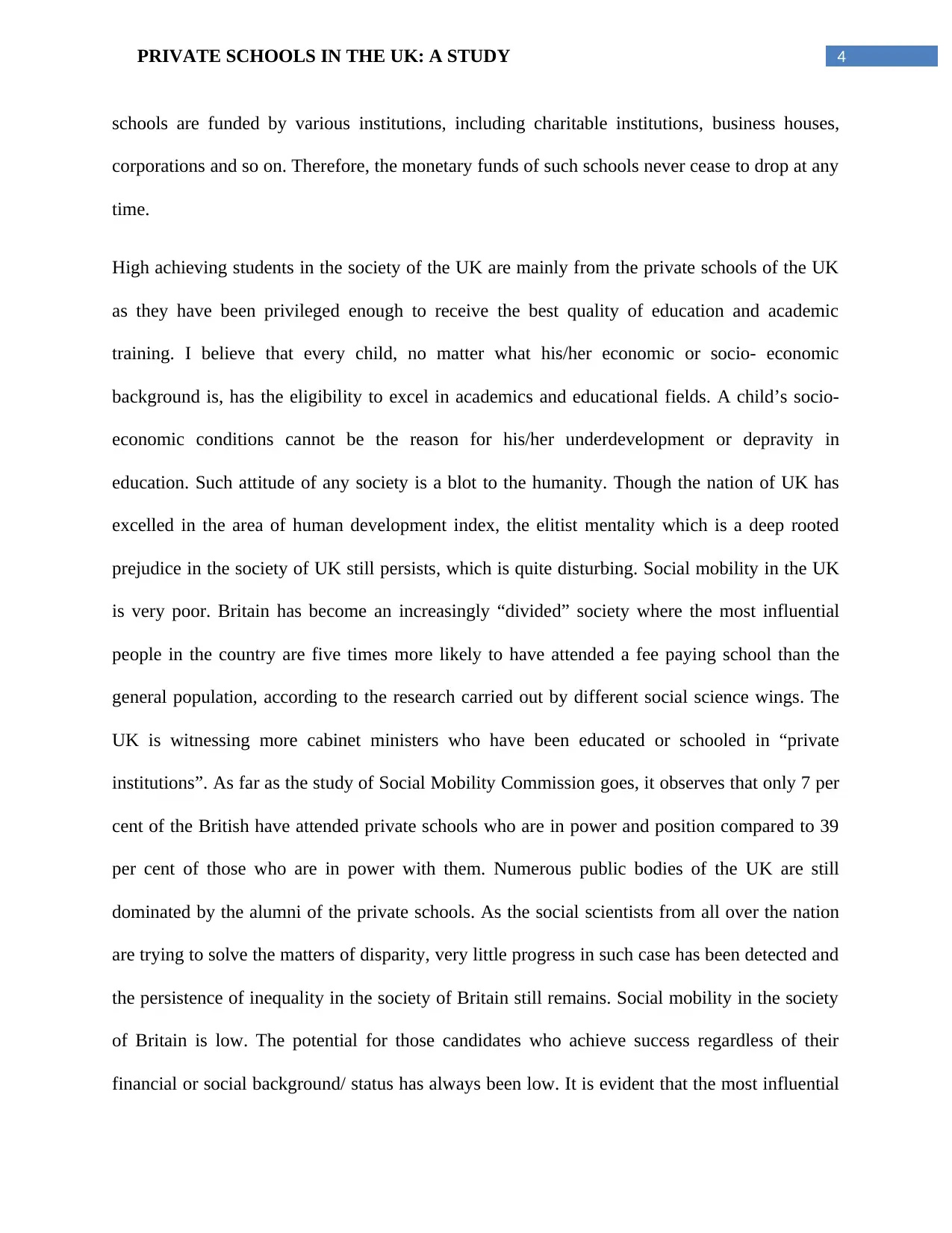
4PRIVATE SCHOOLS IN THE UK: A STUDY
schools are funded by various institutions, including charitable institutions, business houses,
corporations and so on. Therefore, the monetary funds of such schools never cease to drop at any
time.
High achieving students in the society of the UK are mainly from the private schools of the UK
as they have been privileged enough to receive the best quality of education and academic
training. I believe that every child, no matter what his/her economic or socio- economic
background is, has the eligibility to excel in academics and educational fields. A child’s socio-
economic conditions cannot be the reason for his/her underdevelopment or depravity in
education. Such attitude of any society is a blot to the humanity. Though the nation of UK has
excelled in the area of human development index, the elitist mentality which is a deep rooted
prejudice in the society of UK still persists, which is quite disturbing. Social mobility in the UK
is very poor. Britain has become an increasingly “divided” society where the most influential
people in the country are five times more likely to have attended a fee paying school than the
general population, according to the research carried out by different social science wings. The
UK is witnessing more cabinet ministers who have been educated or schooled in “private
institutions”. As far as the study of Social Mobility Commission goes, it observes that only 7 per
cent of the British have attended private schools who are in power and position compared to 39
per cent of those who are in power with them. Numerous public bodies of the UK are still
dominated by the alumni of the private schools. As the social scientists from all over the nation
are trying to solve the matters of disparity, very little progress in such case has been detected and
the persistence of inequality in the society of Britain still remains. Social mobility in the society
of Britain is low. The potential for those candidates who achieve success regardless of their
financial or social background/ status has always been low. It is evident that the most influential
schools are funded by various institutions, including charitable institutions, business houses,
corporations and so on. Therefore, the monetary funds of such schools never cease to drop at any
time.
High achieving students in the society of the UK are mainly from the private schools of the UK
as they have been privileged enough to receive the best quality of education and academic
training. I believe that every child, no matter what his/her economic or socio- economic
background is, has the eligibility to excel in academics and educational fields. A child’s socio-
economic conditions cannot be the reason for his/her underdevelopment or depravity in
education. Such attitude of any society is a blot to the humanity. Though the nation of UK has
excelled in the area of human development index, the elitist mentality which is a deep rooted
prejudice in the society of UK still persists, which is quite disturbing. Social mobility in the UK
is very poor. Britain has become an increasingly “divided” society where the most influential
people in the country are five times more likely to have attended a fee paying school than the
general population, according to the research carried out by different social science wings. The
UK is witnessing more cabinet ministers who have been educated or schooled in “private
institutions”. As far as the study of Social Mobility Commission goes, it observes that only 7 per
cent of the British have attended private schools who are in power and position compared to 39
per cent of those who are in power with them. Numerous public bodies of the UK are still
dominated by the alumni of the private schools. As the social scientists from all over the nation
are trying to solve the matters of disparity, very little progress in such case has been detected and
the persistence of inequality in the society of Britain still remains. Social mobility in the society
of Britain is low. The potential for those candidates who achieve success regardless of their
financial or social background/ status has always been low. It is evident that the most influential
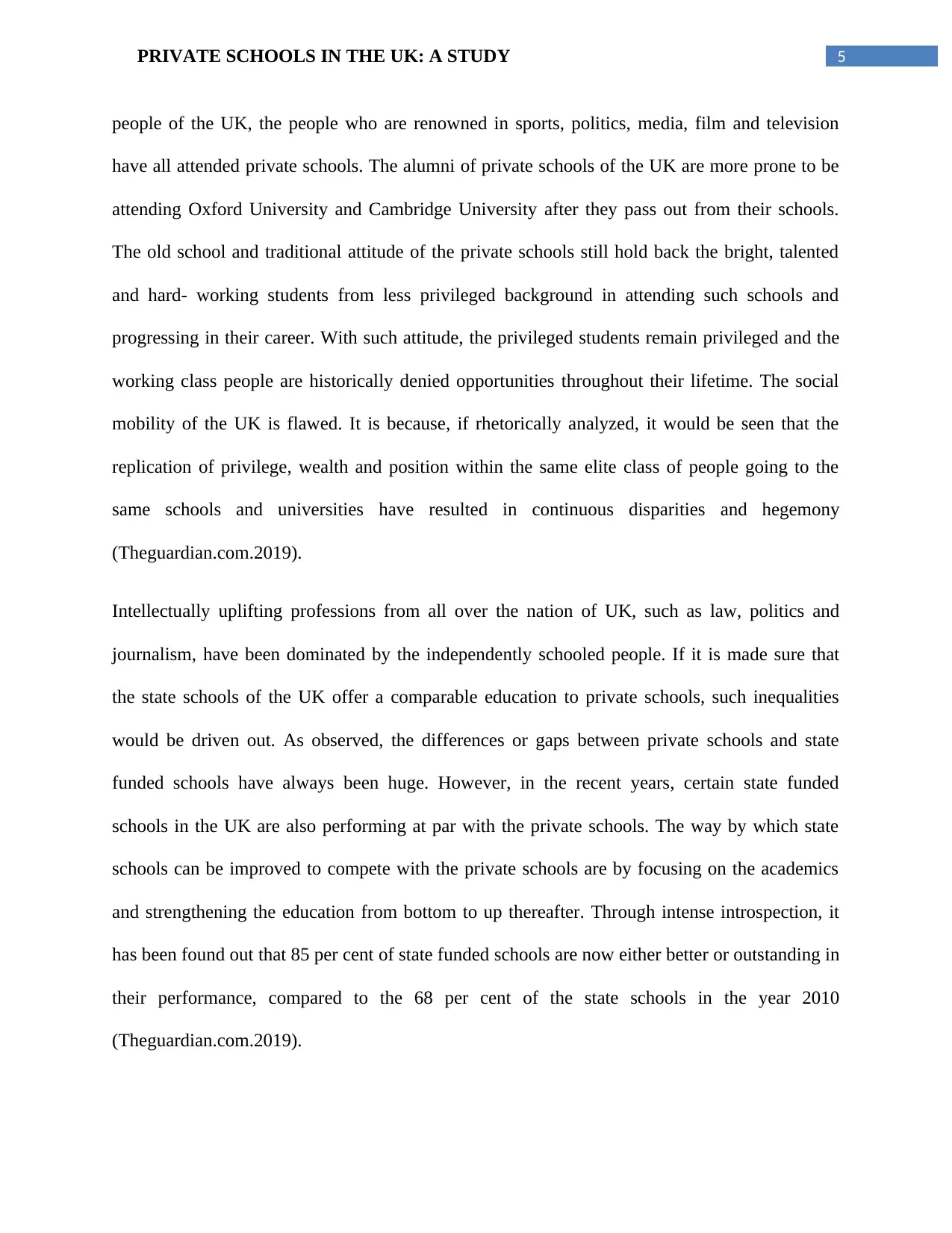
5PRIVATE SCHOOLS IN THE UK: A STUDY
people of the UK, the people who are renowned in sports, politics, media, film and television
have all attended private schools. The alumni of private schools of the UK are more prone to be
attending Oxford University and Cambridge University after they pass out from their schools.
The old school and traditional attitude of the private schools still hold back the bright, talented
and hard- working students from less privileged background in attending such schools and
progressing in their career. With such attitude, the privileged students remain privileged and the
working class people are historically denied opportunities throughout their lifetime. The social
mobility of the UK is flawed. It is because, if rhetorically analyzed, it would be seen that the
replication of privilege, wealth and position within the same elite class of people going to the
same schools and universities have resulted in continuous disparities and hegemony
(Theguardian.com.2019).
Intellectually uplifting professions from all over the nation of UK, such as law, politics and
journalism, have been dominated by the independently schooled people. If it is made sure that
the state schools of the UK offer a comparable education to private schools, such inequalities
would be driven out. As observed, the differences or gaps between private schools and state
funded schools have always been huge. However, in the recent years, certain state funded
schools in the UK are also performing at par with the private schools. The way by which state
schools can be improved to compete with the private schools are by focusing on the academics
and strengthening the education from bottom to up thereafter. Through intense introspection, it
has been found out that 85 per cent of state funded schools are now either better or outstanding in
their performance, compared to the 68 per cent of the state schools in the year 2010
(Theguardian.com.2019).
people of the UK, the people who are renowned in sports, politics, media, film and television
have all attended private schools. The alumni of private schools of the UK are more prone to be
attending Oxford University and Cambridge University after they pass out from their schools.
The old school and traditional attitude of the private schools still hold back the bright, talented
and hard- working students from less privileged background in attending such schools and
progressing in their career. With such attitude, the privileged students remain privileged and the
working class people are historically denied opportunities throughout their lifetime. The social
mobility of the UK is flawed. It is because, if rhetorically analyzed, it would be seen that the
replication of privilege, wealth and position within the same elite class of people going to the
same schools and universities have resulted in continuous disparities and hegemony
(Theguardian.com.2019).
Intellectually uplifting professions from all over the nation of UK, such as law, politics and
journalism, have been dominated by the independently schooled people. If it is made sure that
the state schools of the UK offer a comparable education to private schools, such inequalities
would be driven out. As observed, the differences or gaps between private schools and state
funded schools have always been huge. However, in the recent years, certain state funded
schools in the UK are also performing at par with the private schools. The way by which state
schools can be improved to compete with the private schools are by focusing on the academics
and strengthening the education from bottom to up thereafter. Through intense introspection, it
has been found out that 85 per cent of state funded schools are now either better or outstanding in
their performance, compared to the 68 per cent of the state schools in the year 2010
(Theguardian.com.2019).
⊘ This is a preview!⊘
Do you want full access?
Subscribe today to unlock all pages.

Trusted by 1+ million students worldwide
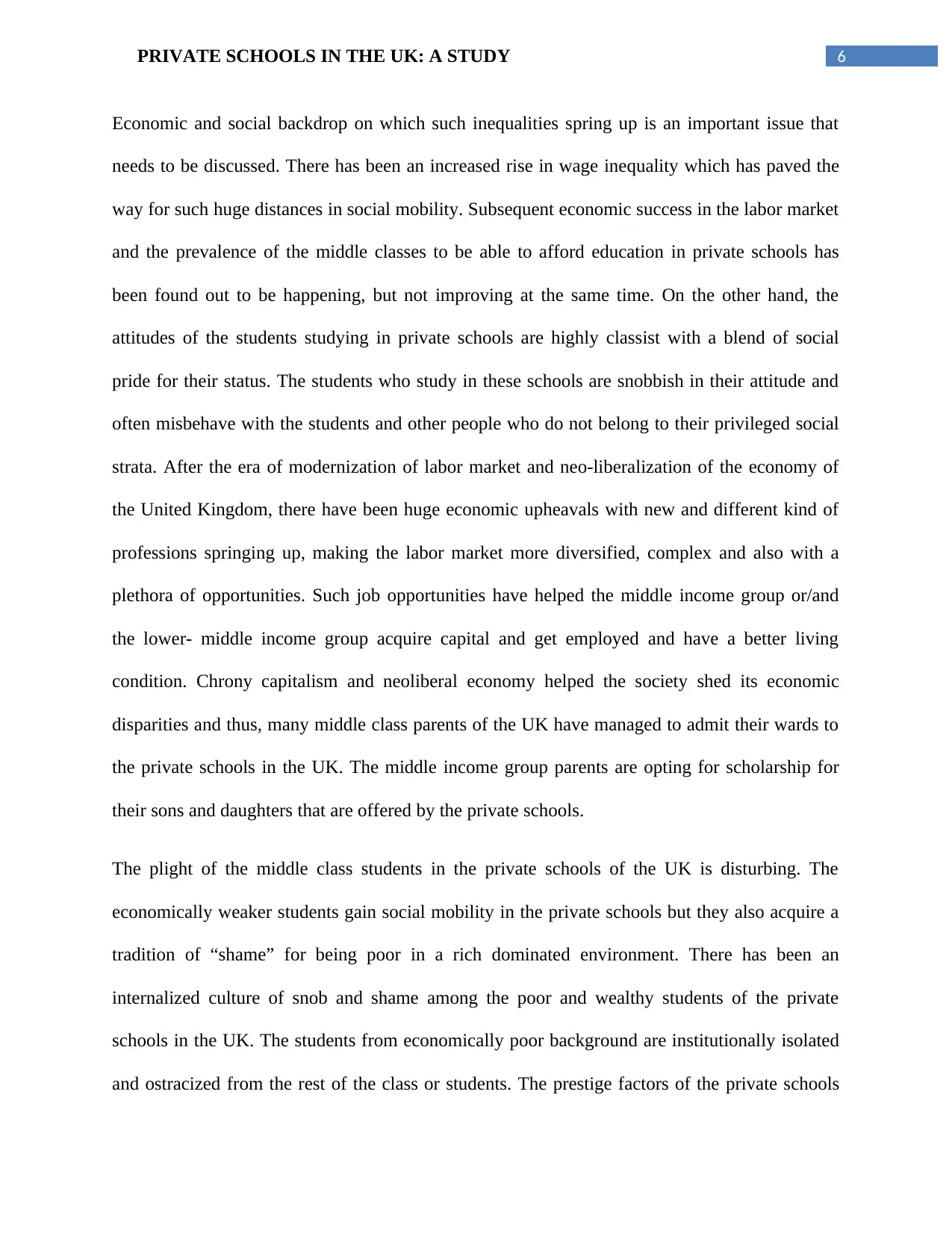
6PRIVATE SCHOOLS IN THE UK: A STUDY
Economic and social backdrop on which such inequalities spring up is an important issue that
needs to be discussed. There has been an increased rise in wage inequality which has paved the
way for such huge distances in social mobility. Subsequent economic success in the labor market
and the prevalence of the middle classes to be able to afford education in private schools has
been found out to be happening, but not improving at the same time. On the other hand, the
attitudes of the students studying in private schools are highly classist with a blend of social
pride for their status. The students who study in these schools are snobbish in their attitude and
often misbehave with the students and other people who do not belong to their privileged social
strata. After the era of modernization of labor market and neo-liberalization of the economy of
the United Kingdom, there have been huge economic upheavals with new and different kind of
professions springing up, making the labor market more diversified, complex and also with a
plethora of opportunities. Such job opportunities have helped the middle income group or/and
the lower- middle income group acquire capital and get employed and have a better living
condition. Chrony capitalism and neoliberal economy helped the society shed its economic
disparities and thus, many middle class parents of the UK have managed to admit their wards to
the private schools in the UK. The middle income group parents are opting for scholarship for
their sons and daughters that are offered by the private schools.
The plight of the middle class students in the private schools of the UK is disturbing. The
economically weaker students gain social mobility in the private schools but they also acquire a
tradition of “shame” for being poor in a rich dominated environment. There has been an
internalized culture of snob and shame among the poor and wealthy students of the private
schools in the UK. The students from economically poor background are institutionally isolated
and ostracized from the rest of the class or students. The prestige factors of the private schools
Economic and social backdrop on which such inequalities spring up is an important issue that
needs to be discussed. There has been an increased rise in wage inequality which has paved the
way for such huge distances in social mobility. Subsequent economic success in the labor market
and the prevalence of the middle classes to be able to afford education in private schools has
been found out to be happening, but not improving at the same time. On the other hand, the
attitudes of the students studying in private schools are highly classist with a blend of social
pride for their status. The students who study in these schools are snobbish in their attitude and
often misbehave with the students and other people who do not belong to their privileged social
strata. After the era of modernization of labor market and neo-liberalization of the economy of
the United Kingdom, there have been huge economic upheavals with new and different kind of
professions springing up, making the labor market more diversified, complex and also with a
plethora of opportunities. Such job opportunities have helped the middle income group or/and
the lower- middle income group acquire capital and get employed and have a better living
condition. Chrony capitalism and neoliberal economy helped the society shed its economic
disparities and thus, many middle class parents of the UK have managed to admit their wards to
the private schools in the UK. The middle income group parents are opting for scholarship for
their sons and daughters that are offered by the private schools.
The plight of the middle class students in the private schools of the UK is disturbing. The
economically weaker students gain social mobility in the private schools but they also acquire a
tradition of “shame” for being poor in a rich dominated environment. There has been an
internalized culture of snob and shame among the poor and wealthy students of the private
schools in the UK. The students from economically poor background are institutionally isolated
and ostracized from the rest of the class or students. The prestige factors of the private schools
Paraphrase This Document
Need a fresh take? Get an instant paraphrase of this document with our AI Paraphraser
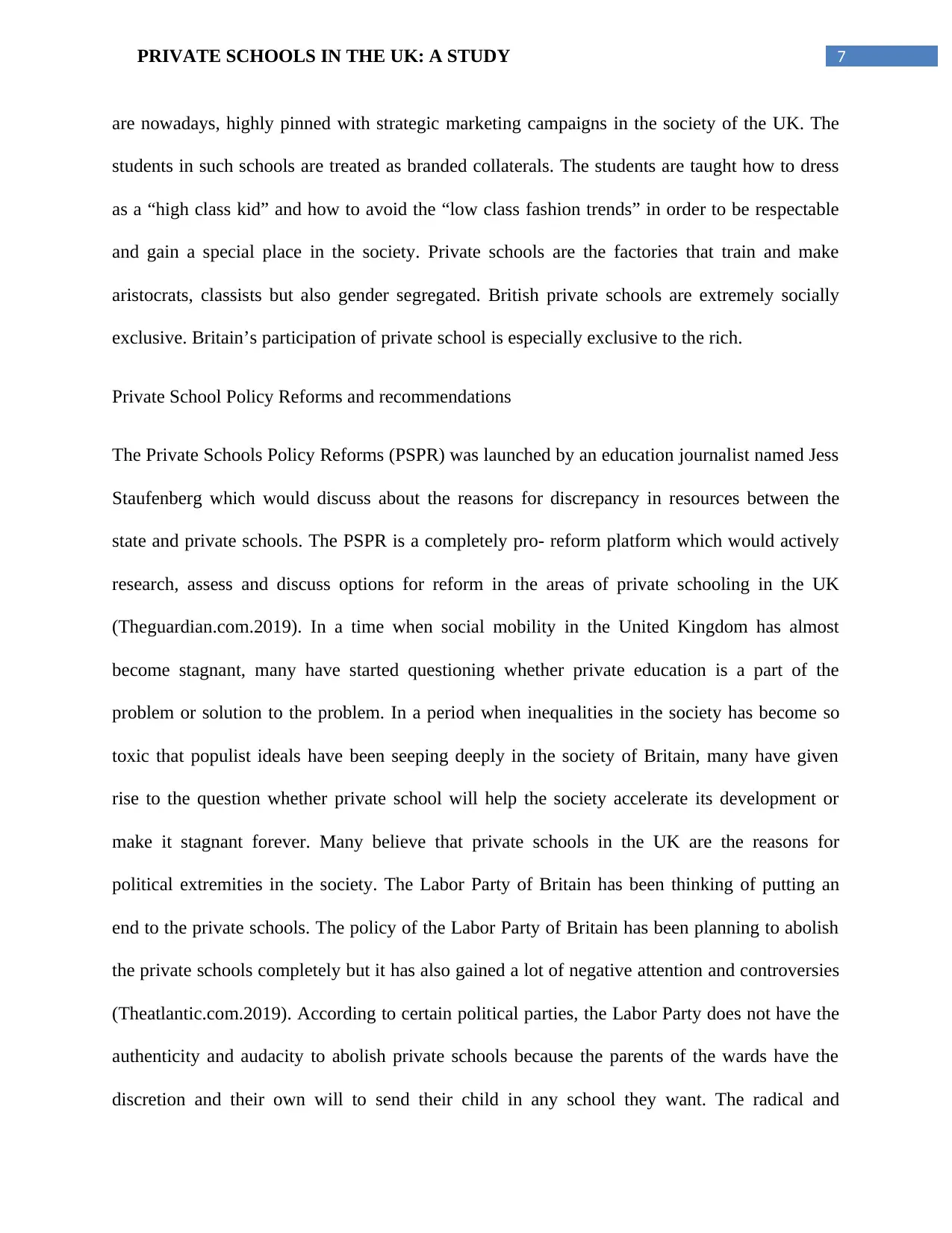
7PRIVATE SCHOOLS IN THE UK: A STUDY
are nowadays, highly pinned with strategic marketing campaigns in the society of the UK. The
students in such schools are treated as branded collaterals. The students are taught how to dress
as a “high class kid” and how to avoid the “low class fashion trends” in order to be respectable
and gain a special place in the society. Private schools are the factories that train and make
aristocrats, classists but also gender segregated. British private schools are extremely socially
exclusive. Britain’s participation of private school is especially exclusive to the rich.
Private School Policy Reforms and recommendations
The Private Schools Policy Reforms (PSPR) was launched by an education journalist named Jess
Staufenberg which would discuss about the reasons for discrepancy in resources between the
state and private schools. The PSPR is a completely pro- reform platform which would actively
research, assess and discuss options for reform in the areas of private schooling in the UK
(Theguardian.com.2019). In a time when social mobility in the United Kingdom has almost
become stagnant, many have started questioning whether private education is a part of the
problem or solution to the problem. In a period when inequalities in the society has become so
toxic that populist ideals have been seeping deeply in the society of Britain, many have given
rise to the question whether private school will help the society accelerate its development or
make it stagnant forever. Many believe that private schools in the UK are the reasons for
political extremities in the society. The Labor Party of Britain has been thinking of putting an
end to the private schools. The policy of the Labor Party of Britain has been planning to abolish
the private schools completely but it has also gained a lot of negative attention and controversies
(Theatlantic.com.2019). According to certain political parties, the Labor Party does not have the
authenticity and audacity to abolish private schools because the parents of the wards have the
discretion and their own will to send their child in any school they want. The radical and
are nowadays, highly pinned with strategic marketing campaigns in the society of the UK. The
students in such schools are treated as branded collaterals. The students are taught how to dress
as a “high class kid” and how to avoid the “low class fashion trends” in order to be respectable
and gain a special place in the society. Private schools are the factories that train and make
aristocrats, classists but also gender segregated. British private schools are extremely socially
exclusive. Britain’s participation of private school is especially exclusive to the rich.
Private School Policy Reforms and recommendations
The Private Schools Policy Reforms (PSPR) was launched by an education journalist named Jess
Staufenberg which would discuss about the reasons for discrepancy in resources between the
state and private schools. The PSPR is a completely pro- reform platform which would actively
research, assess and discuss options for reform in the areas of private schooling in the UK
(Theguardian.com.2019). In a time when social mobility in the United Kingdom has almost
become stagnant, many have started questioning whether private education is a part of the
problem or solution to the problem. In a period when inequalities in the society has become so
toxic that populist ideals have been seeping deeply in the society of Britain, many have given
rise to the question whether private school will help the society accelerate its development or
make it stagnant forever. Many believe that private schools in the UK are the reasons for
political extremities in the society. The Labor Party of Britain has been thinking of putting an
end to the private schools. The policy of the Labor Party of Britain has been planning to abolish
the private schools completely but it has also gained a lot of negative attention and controversies
(Theatlantic.com.2019). According to certain political parties, the Labor Party does not have the
authenticity and audacity to abolish private schools because the parents of the wards have the
discretion and their own will to send their child in any school they want. The radical and
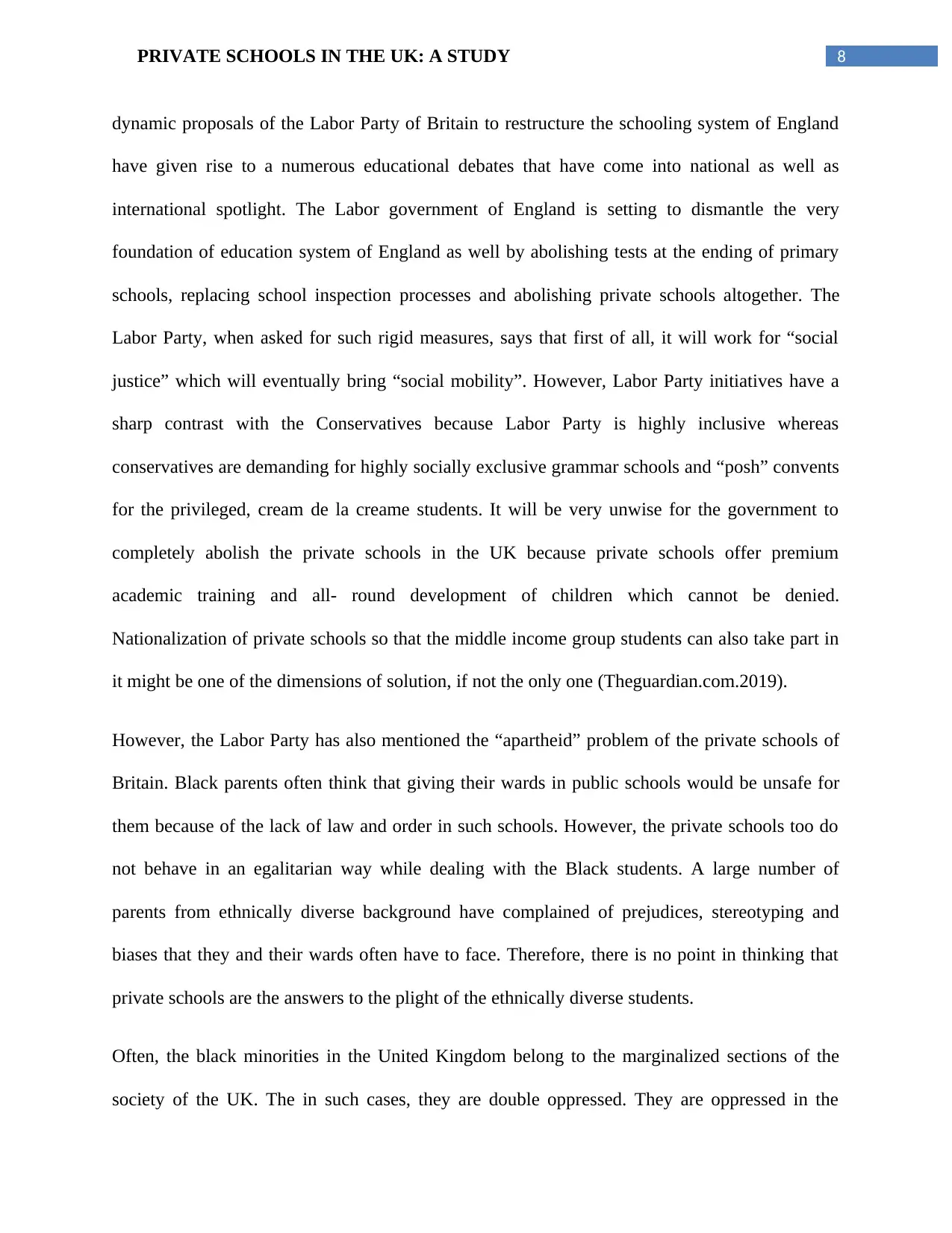
8PRIVATE SCHOOLS IN THE UK: A STUDY
dynamic proposals of the Labor Party of Britain to restructure the schooling system of England
have given rise to a numerous educational debates that have come into national as well as
international spotlight. The Labor government of England is setting to dismantle the very
foundation of education system of England as well by abolishing tests at the ending of primary
schools, replacing school inspection processes and abolishing private schools altogether. The
Labor Party, when asked for such rigid measures, says that first of all, it will work for “social
justice” which will eventually bring “social mobility”. However, Labor Party initiatives have a
sharp contrast with the Conservatives because Labor Party is highly inclusive whereas
conservatives are demanding for highly socially exclusive grammar schools and “posh” convents
for the privileged, cream de la creame students. It will be very unwise for the government to
completely abolish the private schools in the UK because private schools offer premium
academic training and all- round development of children which cannot be denied.
Nationalization of private schools so that the middle income group students can also take part in
it might be one of the dimensions of solution, if not the only one (Theguardian.com.2019).
However, the Labor Party has also mentioned the “apartheid” problem of the private schools of
Britain. Black parents often think that giving their wards in public schools would be unsafe for
them because of the lack of law and order in such schools. However, the private schools too do
not behave in an egalitarian way while dealing with the Black students. A large number of
parents from ethnically diverse background have complained of prejudices, stereotyping and
biases that they and their wards often have to face. Therefore, there is no point in thinking that
private schools are the answers to the plight of the ethnically diverse students.
Often, the black minorities in the United Kingdom belong to the marginalized sections of the
society of the UK. The in such cases, they are double oppressed. They are oppressed in the
dynamic proposals of the Labor Party of Britain to restructure the schooling system of England
have given rise to a numerous educational debates that have come into national as well as
international spotlight. The Labor government of England is setting to dismantle the very
foundation of education system of England as well by abolishing tests at the ending of primary
schools, replacing school inspection processes and abolishing private schools altogether. The
Labor Party, when asked for such rigid measures, says that first of all, it will work for “social
justice” which will eventually bring “social mobility”. However, Labor Party initiatives have a
sharp contrast with the Conservatives because Labor Party is highly inclusive whereas
conservatives are demanding for highly socially exclusive grammar schools and “posh” convents
for the privileged, cream de la creame students. It will be very unwise for the government to
completely abolish the private schools in the UK because private schools offer premium
academic training and all- round development of children which cannot be denied.
Nationalization of private schools so that the middle income group students can also take part in
it might be one of the dimensions of solution, if not the only one (Theguardian.com.2019).
However, the Labor Party has also mentioned the “apartheid” problem of the private schools of
Britain. Black parents often think that giving their wards in public schools would be unsafe for
them because of the lack of law and order in such schools. However, the private schools too do
not behave in an egalitarian way while dealing with the Black students. A large number of
parents from ethnically diverse background have complained of prejudices, stereotyping and
biases that they and their wards often have to face. Therefore, there is no point in thinking that
private schools are the answers to the plight of the ethnically diverse students.
Often, the black minorities in the United Kingdom belong to the marginalized sections of the
society of the UK. The in such cases, they are double oppressed. They are oppressed in the
⊘ This is a preview!⊘
Do you want full access?
Subscribe today to unlock all pages.

Trusted by 1+ million students worldwide
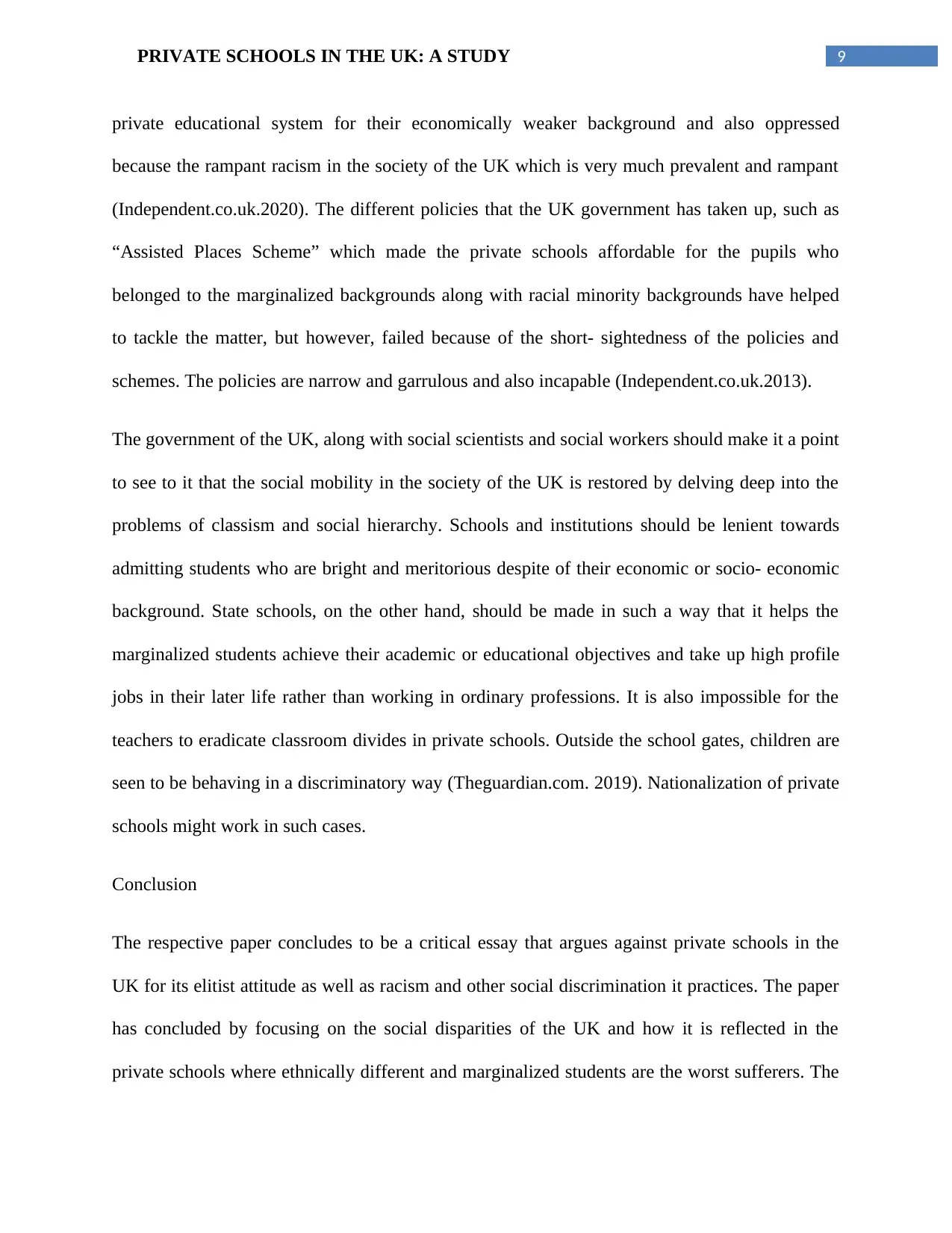
9PRIVATE SCHOOLS IN THE UK: A STUDY
private educational system for their economically weaker background and also oppressed
because the rampant racism in the society of the UK which is very much prevalent and rampant
(Independent.co.uk.2020). The different policies that the UK government has taken up, such as
“Assisted Places Scheme” which made the private schools affordable for the pupils who
belonged to the marginalized backgrounds along with racial minority backgrounds have helped
to tackle the matter, but however, failed because of the short- sightedness of the policies and
schemes. The policies are narrow and garrulous and also incapable (Independent.co.uk.2013).
The government of the UK, along with social scientists and social workers should make it a point
to see to it that the social mobility in the society of the UK is restored by delving deep into the
problems of classism and social hierarchy. Schools and institutions should be lenient towards
admitting students who are bright and meritorious despite of their economic or socio- economic
background. State schools, on the other hand, should be made in such a way that it helps the
marginalized students achieve their academic or educational objectives and take up high profile
jobs in their later life rather than working in ordinary professions. It is also impossible for the
teachers to eradicate classroom divides in private schools. Outside the school gates, children are
seen to be behaving in a discriminatory way (Theguardian.com. 2019). Nationalization of private
schools might work in such cases.
Conclusion
The respective paper concludes to be a critical essay that argues against private schools in the
UK for its elitist attitude as well as racism and other social discrimination it practices. The paper
has concluded by focusing on the social disparities of the UK and how it is reflected in the
private schools where ethnically different and marginalized students are the worst sufferers. The
private educational system for their economically weaker background and also oppressed
because the rampant racism in the society of the UK which is very much prevalent and rampant
(Independent.co.uk.2020). The different policies that the UK government has taken up, such as
“Assisted Places Scheme” which made the private schools affordable for the pupils who
belonged to the marginalized backgrounds along with racial minority backgrounds have helped
to tackle the matter, but however, failed because of the short- sightedness of the policies and
schemes. The policies are narrow and garrulous and also incapable (Independent.co.uk.2013).
The government of the UK, along with social scientists and social workers should make it a point
to see to it that the social mobility in the society of the UK is restored by delving deep into the
problems of classism and social hierarchy. Schools and institutions should be lenient towards
admitting students who are bright and meritorious despite of their economic or socio- economic
background. State schools, on the other hand, should be made in such a way that it helps the
marginalized students achieve their academic or educational objectives and take up high profile
jobs in their later life rather than working in ordinary professions. It is also impossible for the
teachers to eradicate classroom divides in private schools. Outside the school gates, children are
seen to be behaving in a discriminatory way (Theguardian.com. 2019). Nationalization of private
schools might work in such cases.
Conclusion
The respective paper concludes to be a critical essay that argues against private schools in the
UK for its elitist attitude as well as racism and other social discrimination it practices. The paper
has concluded by focusing on the social disparities of the UK and how it is reflected in the
private schools where ethnically different and marginalized students are the worst sufferers. The
Paraphrase This Document
Need a fresh take? Get an instant paraphrase of this document with our AI Paraphraser
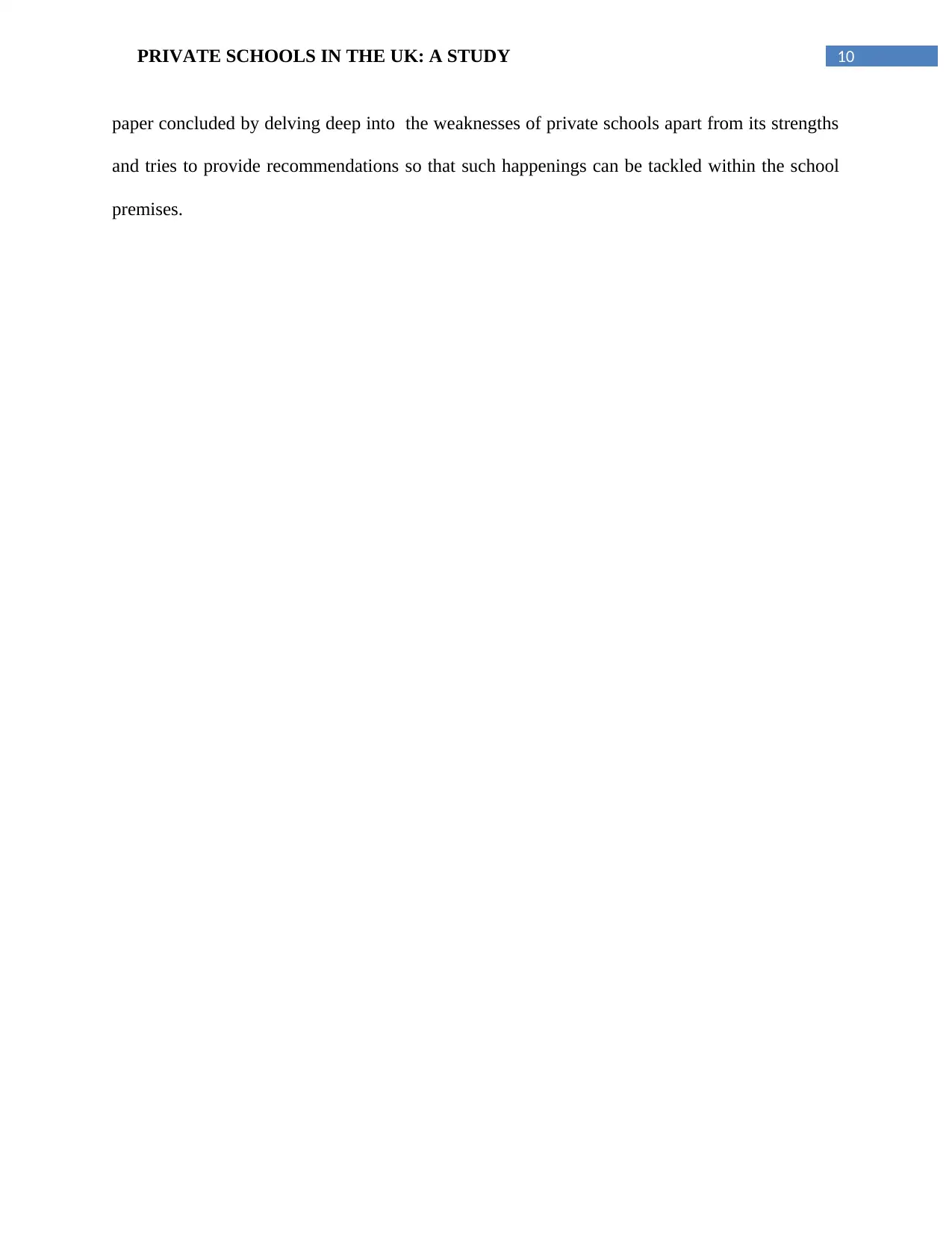
10PRIVATE SCHOOLS IN THE UK: A STUDY
paper concluded by delving deep into the weaknesses of private schools apart from its strengths
and tries to provide recommendations so that such happenings can be tackled within the school
premises.
paper concluded by delving deep into the weaknesses of private schools apart from its strengths
and tries to provide recommendations so that such happenings can be tackled within the school
premises.
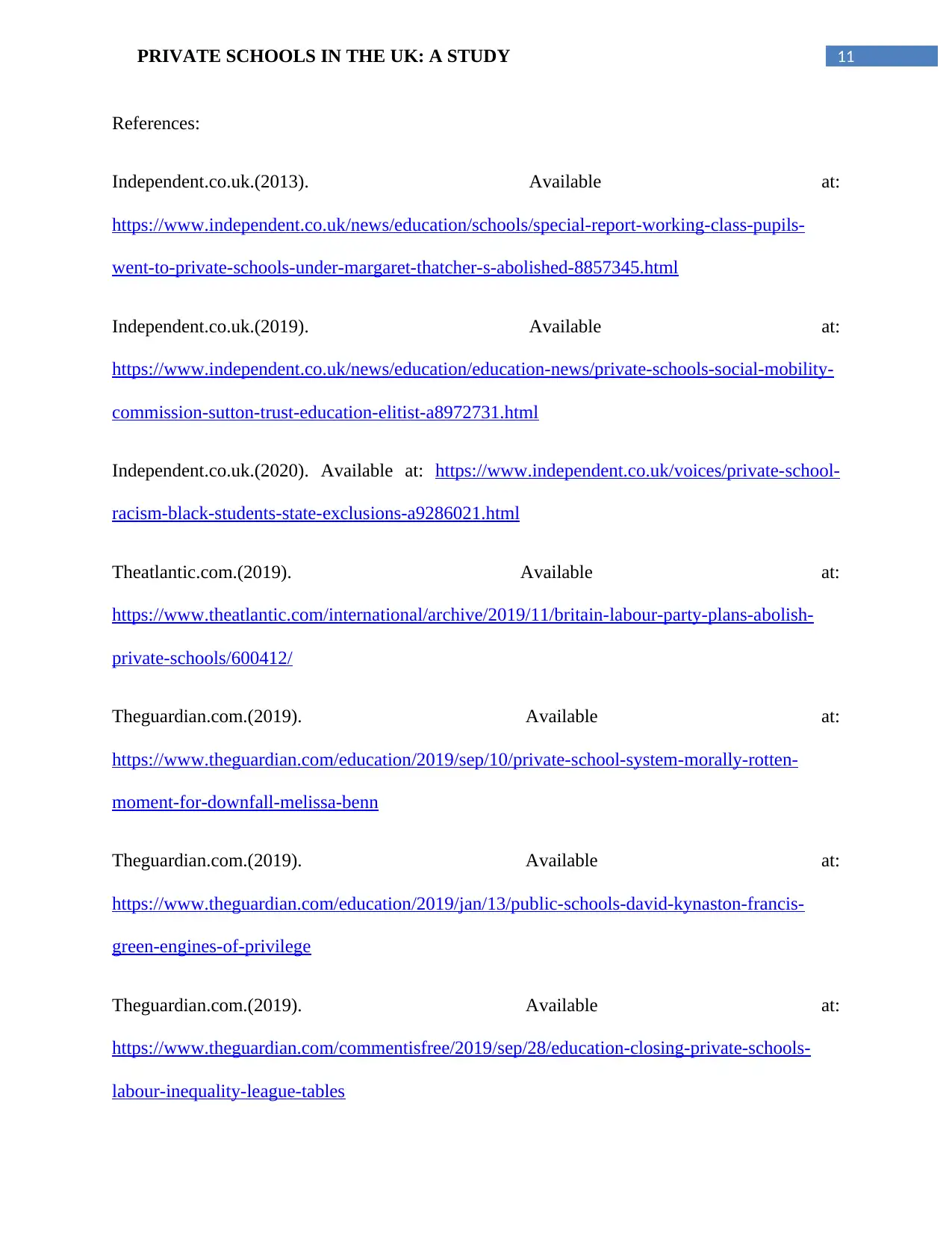
11PRIVATE SCHOOLS IN THE UK: A STUDY
References:
Independent.co.uk.(2013). Available at:
https://www.independent.co.uk/news/education/schools/special-report-working-class-pupils-
went-to-private-schools-under-margaret-thatcher-s-abolished-8857345.html
Independent.co.uk.(2019). Available at:
https://www.independent.co.uk/news/education/education-news/private-schools-social-mobility-
commission-sutton-trust-education-elitist-a8972731.html
Independent.co.uk.(2020). Available at: https://www.independent.co.uk/voices/private-school-
racism-black-students-state-exclusions-a9286021.html
Theatlantic.com.(2019). Available at:
https://www.theatlantic.com/international/archive/2019/11/britain-labour-party-plans-abolish-
private-schools/600412/
Theguardian.com.(2019). Available at:
https://www.theguardian.com/education/2019/sep/10/private-school-system-morally-rotten-
moment-for-downfall-melissa-benn
Theguardian.com.(2019). Available at:
https://www.theguardian.com/education/2019/jan/13/public-schools-david-kynaston-francis-
green-engines-of-privilege
Theguardian.com.(2019). Available at:
https://www.theguardian.com/commentisfree/2019/sep/28/education-closing-private-schools-
labour-inequality-league-tables
References:
Independent.co.uk.(2013). Available at:
https://www.independent.co.uk/news/education/schools/special-report-working-class-pupils-
went-to-private-schools-under-margaret-thatcher-s-abolished-8857345.html
Independent.co.uk.(2019). Available at:
https://www.independent.co.uk/news/education/education-news/private-schools-social-mobility-
commission-sutton-trust-education-elitist-a8972731.html
Independent.co.uk.(2020). Available at: https://www.independent.co.uk/voices/private-school-
racism-black-students-state-exclusions-a9286021.html
Theatlantic.com.(2019). Available at:
https://www.theatlantic.com/international/archive/2019/11/britain-labour-party-plans-abolish-
private-schools/600412/
Theguardian.com.(2019). Available at:
https://www.theguardian.com/education/2019/sep/10/private-school-system-morally-rotten-
moment-for-downfall-melissa-benn
Theguardian.com.(2019). Available at:
https://www.theguardian.com/education/2019/jan/13/public-schools-david-kynaston-francis-
green-engines-of-privilege
Theguardian.com.(2019). Available at:
https://www.theguardian.com/commentisfree/2019/sep/28/education-closing-private-schools-
labour-inequality-league-tables
⊘ This is a preview!⊘
Do you want full access?
Subscribe today to unlock all pages.

Trusted by 1+ million students worldwide
1 out of 12
Related Documents
Your All-in-One AI-Powered Toolkit for Academic Success.
+13062052269
info@desklib.com
Available 24*7 on WhatsApp / Email
![[object Object]](/_next/static/media/star-bottom.7253800d.svg)
Unlock your academic potential
Copyright © 2020–2026 A2Z Services. All Rights Reserved. Developed and managed by ZUCOL.



